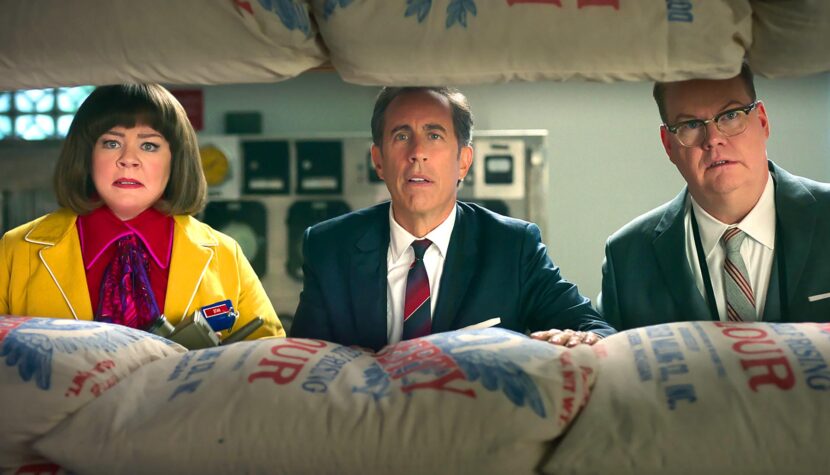UNFROSTED. Almost culinary science fiction

The taste of cornflake milk soup is nothing legendary. Just sweetened milk, that’s it. I’m embarrassed to admit I’ve never eaten Kellogg’s or Post flakes because when I could have, they weren’t in stores. There were other local brands, but without surprises in the boxes. Now I can buy them, though not as popular as Nestle; I prefer pouring muesli with good buttermilk. Unexpectedly, film criticism merged with my gastric experiences, but these cinematic moments, thanks to “Unfrosted,” turned out to be pleasantly unreal. This unassuming title, directed by Jerry Seinfeld and starring him, can be watched on Netflix. Unfortunately, it might not catch viewers’ attention, but they might like it due to its interesting aesthetic and surreal story.
There’s just one hook I unpleasantly stumbled upon: Hugh Grant, who plays a disillusioned actor forced by unfair life to play a mascot role in one of the big breakfast sweet-producing companies in “Unfrosted.” Of course, Grant wouldn’t be himself if he didn’t use his talent to become quite a suggestive unemployed artist, mentally trapped in the role of King Lear. The hook is that Grant isn’t actually in the main role, but I fell for that bait, feeling disappointed when it turned out one of the battling company bosses wasn’t Grant. He would have been excellent because even in this small, distinctive role, he outshined both Amy Schumer and Jerry Seinfeld. However, he couldn’t quite click with Melissa McCarthy and Christian Slater as the demonic milkman duo managing a dairy empire alongside Peter Dinklage. There are many stars in this film, like ornaments on a Christmas tree, lacking sometimes a real sharp and authentic joke due to a lack of ideas. Yes, even though I recommend “Unfrosted,” I see its flaws, even if scenes like the milk-flake funeral or the row of cows excreting seem like an interesting alternative to torture by electrically shocking the victim’s testicles, preventing the thought of halting breakfast cereal production. It all sounds somewhat surreal, and that’s how it’s executed—colorful shots, high saturation, set designs utilizing everything most characteristic of the ’60s across the ocean, and sometimes overly exaggerated characterizations among which it’s really hard to pinpoint one main antagonist. And that’s good. At least the viewer isn’t fixated on some linear plot leading to confrontation. It remains suspended in the finale.

The film starts quickly and ends even faster. Ninety-three minutes of projection time isn’t much by today’s standards. Maybe if they found another 20 minutes, the narration would be calmer at times. Viewers might miss that, and I also sometimes felt treated a bit indifferently. I hoped for a few more solutions, but the film unexpectedly ended. More sugar or more gluten didn’t help the taste—one of the cereal producers’ important axioms. The competition to sell more flakes and release a new product that will finish off the competition is somewhat un-European because our breakfasts are healthier now, or at least that’s how it seems to me, compared to my childhood. I think it’s better to eat rice with milk than to gorge on highly processed corn with a ton of sugar for flavor. And “Unfrosted” doesn’t shy away from this painful reflection on the quality of American food, openly presenting how they manufacture attractive cereal flavors and what drives their designers. It’s definitely not for the health of consumers, most of whom are children.

This highly experimental and unscrupulous approach leads our heroes to create a new culinary life. This is precisely that science fiction element, directly referencing “Alien,” which I didn’t realize at first, so kudos to the creators for that subtle nod to such a cinema icon. On the other hand, let’s not fool ourselves— “Unfrosted” won’t succeed. It’s too crazy and sometimes humorously inaccessible, yet also too restrained and uncontroversial to turn the rare theme of a commercial-culinary war into something cult-worthy in cinema. The film reminds me of Forrest Gump’s box of chocolates or Harry Potter’s Bertie Bott’s Every Flavor Beans. You might encounter a delicious red-orange flavor with a hint of ginger or a hideous green glut from the nose. It all depends on personal sensitivity and when you watch the film. Sometimes you laugh, sometimes you feel slightly bored by predictability. Overall, however, one cannot fail to appreciate the idea of transitioning from a breakfast cereal market war to creating autonomous cookies that you have to hunt down to finally eat. You can take this statement as a metaphor or understand it quite literally. In both cases, you’ll hit the mark.

